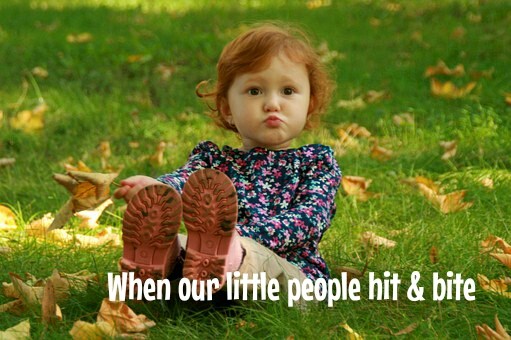There are a few things I find helpful to keep in mind when dealing with the sometimes crazy transition from sweet, gentle, loving babyhood…to intense, fiery, demonstrative and often aggressive toddlerhood. It can be challenging to say the least when coping with this contrasting and often sudden change. For a whole host of reasons toddlers do things like bite, push, hit, throw things and so on. Realistically, we cannot expect them to stop or alter these behaviours. We need to understand and manage them in order to minimise everyone’s frustration and to maintain positive relationships.
Things to Remember
* It’s normal.
* It’s developmental.
* Saying “no” won’t stop the behaviour.
* They haven’t learnt to communicate effectively. Nor have they come any where near close to mastering competent language skills. So they are easily and frequently frustrated.
* Their brains are nowhere near fully developed. Which means they aren’t capable of things like impulse control or empathy yet.
* Not having adequate empathy means showing them that you are upset won’t be effective. It will, however, intrigue them and they will likely do the behaviour even more.
* If you say things like “Please don’t hit _____” they hear the final word or two and do exactly that. Zero impulse control, plus minimal language skills.
Things to Do
* Say what you want to happen.
Don’t verbalise the undesired behaviour. For example, “Let’s use gentle hands” and stroke one another, or “Let’s use fun hands” and clap together while singing a song.
* Identify and acknowledge their feelings if they’re mad, sad etc.
Say “You’re feeling mad about ____”, “would you like a cuddle, run outside etc? ”
* Distract. The more you focus on it, talk about it or ask them to stop, the more they will almost obsess over it.
A quick example…the other day our toddler tried unclicking her car seat harness while we were driving along. We instantly knew not to even address it. If we did she would be forever drawn to it! So my husband quickly said something like “Hey, what’s that song that goes ____? Let’s sing it and do the actions!” She quickly forgot what she was ever doing with her harness. Yay!
* Stay safe while reassuring.
If your little one is having a tantrum and hitting or kicking you, it’s perfectly acceptable to say “I won’t let you hurt me” and either hold their hands so they can’t hurt you or move away a little bit while still remaining near by. I’d also add calming phrases such as “I’m right here”, “would you like a cuddle?”, “I’m going stay with you, you’re safe” etc.
I know there might be that little voice in your head - or quite literally the voices of those around you - saying “But they need to learn… it’s not ok… I can’t ‘ignore’ this”. Be assured, they will learn. Their brains will keep developing and they will learn all about what is acceptable versus unacceptable behaviour.
Even the tiniest change in our outlook can help during these frustrating periods. Reminding ourselves that this behaviour is normal and won’t last forever helps. While we’re resisting and holding onto expectations that it will or should change, now, we do not cope well. Using some of the tools mentioned above will hopefully shorten this challenging, but entirely normal, phase. Or in the very least help us all to maintain an increased sense of calm and confidence in our approach.


